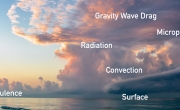Summer 2023 | DTC plays an important role in model development and evaluation for NOAA and the broader Unified Forecast System (UFS) community. My first interaction with DTC was back in 2010 in the Hazardous Weather Testbed (HWT), when the Method for Object-Based Diagnostic Evaluation (MODE) was being tested for convective applications. MODE is part of DTC’s Model Evaluation Tools (MET) and serves as an innovative alternative to traditional grid-based metrics for model evaluation. MODE offers a… Read More
Who's Who: Weiwei Li
Summer 2023 | Weiwei Li joined the Research Applications Laboratory at NCAR in 2018. She leads and contributes to multiple projects focused on assessing model physics performance to inform their improvements in a modeling/forecasting system. She is currently working on testing and evaluation of the physical parameterizations, involving two major modeling systems, i.e., the Unified Forecast System (UFS) and the Model for Prediction Across Scales (MPAS). Her team uses partially idealized simulations… Read More
Bridges to Operations: Informing and Optimizing Ensemble Design in the RRFS

Summer 2023 | Implementing a single-dycore and single-physics RRFS will allow a number of deterministic modeling systems to be retired.
Visitors: Developing a METplus use case for the Grid-Diag tool
Visitor: Marion Mittermaier

Summer 2023 | Marion Mittermaier’s visitor project focused on developing a METplus use case for the Grid-Diag tool, which creates histograms for an arbitrary collection of data fields and levels. Marion used the Grid-Diag tool to investigate the relationship between the forecasted and observed precipitation accumulations for GloSea5, the UK Met Office ensemble seasonal prediction system and how the relationship evolved over time. The project is a sub-task of a larger body of work that uses… Read More
Community Connections: METplus Training Expanded
Summer 2023 | The METplus team launched part one of the METplus Advanced Training Series this past spring, which focused on Prototypes in the Cloud, Subseasonal to Seasonal (S2S) Diagnostics, and Coupled Model Components. The intent of the METplus Advanced Training Series was to extend beyond… Read More
Did you know?: Internship Opportunity
Summer 2023 | The Lapenta internship invites undergraduate (sophomore and junior) as well as graduate students from all STEM disciplines (marine science, atmospheric science, engineering, social science, applied math, etc) to participate in 10-week (early June to mid August) projects that span all five line offices and the Office of Marine and Aviation Operations. These projects are high-impact, short-term research-to-operations (R2O) efforts where students learn coding and networking side-by-side… Read More
Software Release: METplus v5.1 Coordinated Release

2023-08-01 | The DTC is pleased to announce the release of the multi-component verification framework called the enhanced Model Evaluation Tools (METplus), or METplus. METplus contains a suite of Python wrappers and ancillary scripts to enhance the user's ability to quickly set-up and run MET. METplus also has an analysis suite including METviewer and METexpress user interfaces and METdataio, METcalcpy, and METplotpy as shared packages for loading and storing MET output as well as aggregating and… Read More
PROUD Award - Excellence in Action: Kate Fossell, Associate Scientist IV, NCAR/MMM and DTC
Performance Recognition for OUtstanding DTC achievements (PROUD) Award

2023-08-21 | Kate Fossell is an Associate Scientist IV in MMM at NCAR, contributing to two DTC projects; the Unified Post Processor (UPP) and the Numerical Weather Prediction cloud container projects. Kate has worked with the DTC for 10 years with much of her time dedicated to co-leading the UPP project and its growing team through its transition to the Earth Prediction Innovation Center (EPIC) in 2023. During this period, she built a strong collaborative relationship with the UPP team at the NOAA Environmental Modeling Center (EMC),… Read More
Lead Story: CCPP Goes Operational

Spring 2023 | The Hurricane Analysis and Prediction System (HAFS) v1 has been approved for operational implementation for the 2023 hurricane season by NOAA NCEP and, with it, the Common Community Physics Package (CCPP) will be deployed operationally for the first time. This is a major milestone for this software infrastructure. The first set of requirements for the CCPP was established in 2017, following… Read More
Director's Corner: Jennifer Mahoney

Spring 2023 | The DTC serves a vital role in advancing NOAA’s modeling efforts and the community-based Unified Forecasting System (UFS). The DTC is research to operations (R20) and operations to research (O2R) in action. Through model evaluations and support to the community, the impact of the DTC in the delivery of new… Read More
Who's Who: Xia Sun
Spring 2023 | Xia Sun is a numerical weather prediction (NWP) scientist working at the Cooperative Institute for Research in Environmental Sciences at the University of Colorado Boulder (CIRES) and NOAA Global Systems Laboratory. Xia works on hierarchical system development for the Unified Forecast System (UFS) and MYNN-EDMF planetary boundary layer (PBL) physics scheme. Before that, Xia lived in Reno, Nevada for three and… Read More
Bridges to Operations: Initial Operational Implementation of the UFS Hurricane Application

Spring 2023 | The initial operational implementation of the Hurricane Analysis and Forecast System (HAFS) for tropical cyclone (TC) forecasting was recently approved for operations by the NOAA National Centers for Environmental Prediction (NCEP) Central Operations (NCO) in advance of the 2023 Atlantic basin hurricane season. HAFS is the operational instantiation of the Unified Forecast System (UFS) hurricane application, with a focus on transitioning TC modeling research to operations. HAFS is an… Read More
Community Connections: A Forward-looking Virtual Get-together of the CCPP Community

Spring 2023 | As the Common Community Physics Package (CCPP) heads toward operational status within NOAA’s numerical weather prediction (NWP) advancement efforts, the community that helped make it a reality will gather virtually alongside the “CCPP-curious” for the CCPP Visioning Workshop on August 15-17 to discuss plans for its continued improvement over the next 5-10 years. A strong emphasis for the workshop will be placed on accommodating the software coupling needs of the next generation of… Read More
Did you know?: METplus Advanced Training Series Focuses on High Impact Events and Subseasonal to Seasonal Prediction
Spring 2023 | The METplus team offered three sessions of an advanced training series during Spring 2023 and plans to add three to four new sessions during Fall 2023. The intent was to extend beyond the Basic Training Series provided during the winter and spring of 2021/2022. The recorded Basic series and report about the sessions can be found at METplus Training Series… Read More
PROUD Award - Excellence in Action: John Opatz, Associate Scientist III, RAL/NCAR
Performance Recognition for OUtstanding DTC achievements (PROUD) Award

2023-05-17 | John Opatz is an Associate Scientist III in RAL at NCAR contributing his expertise to two DTC projects: the Enhanced Model Evaluation Tools (METplus) and METplus training. John is highly skilled and the go-to scientist for reviewing Pull Requests across METplus repositories. He made 210 METplus GitHub contributions in 2022, defining new issues, committing code changes, updating documentation, and reviewing the work of others. John’s Pull Request reviews are detailed, thoughtful, and comprehensive. He often expands his… Read More
Pagination
Copyright © 2026. All rights reserved.
